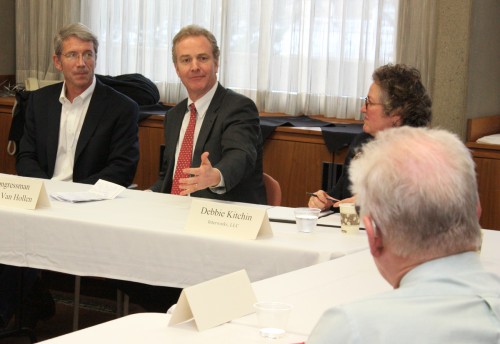This content was published: February 17, 2010. Phone numbers, email addresses, and other information may have changed.
Congressmen, entrepreneurs talk jobs at PCC forum
Story by Dana Haynes and photos by James G. Hill
The U.S. Congress is debating a series of bills to create jobs, and on Tuesday the talks made its way to Portland Community College.
U.S. Rep. Kurt Schrader, a Democrat serving his freshman term in Oregon’s 5th Congressional District, played host to 15 small business entrepreneurs at PCC’s Sylvania Campus Tuesday, Feb. 16. The agenda: taking the pulse of “main street” regarding proposals to lower the nation’s unemployment rate.
Also on hand was U.S. Rep. Chris Van Hollen Jr., D-Maryland, an assistant to the Speaker of the House and chairman of the Democratic Congressional Campaign Committee.
“We’re really here to listen to you; to hear your stories,” Van Hollen told the entrepreneurs who hail from throughout the Oregon’s 5th District, which includes a small portion of the Portland metro area, Marion and Polk counties to the south and extends to the Oregon coast.
The proposals being debated include: A $5,000 tax credit for business that make any new hire; redirecting $30 billion of the Troubled Asset Relief Program (or TARP) to small businesses by way of investing in community banks; and a jobs bill that would focus on infrastructure projects such as roads and bridges.
The $5,000 tax credit drew a divided response from the business owners. Lisa Schroeder of Mother’s Bistro and Bar in Portland favored it. “I think that is going to help contribute to jobs,” she told the congressmen.
Gary Cardwell of Northwest Container Services in Portland disagreed. “Nobody’s going to hire anybody for five grand,” he predicted.
Most of the entrepreneurs told the lawmakers that the real problem in this most recent recession and subsequent, jobless recovery is the lack of loans from banks. “We agree. That’s the sticking point,” Schrader replied.
Jose Gonzalez of Tu Casa Real Estate in Salem praised the idea of redirecting TARP money to community banks, but added that an advisory panel of small business owners should help bankers decide which companies in each community would be a good investment. “We know our own communities. Let us help,” he said.
Fred King, of Fred King and Associates in Portland, agreed. “This isn’t a time for fear, it’s a time for courage,” he said. “And entrepreneurs are pretty courageous.”

